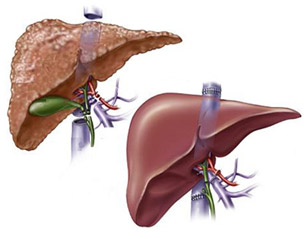The Place of Medications in Cirrhosis Management Before and After Liver Transplant
It is worthwhile to learn how medications can help
manage cirrhosis, whether you are undergoing a liver transplant or have just
undergone one. These medications manage the symptoms, curb the progress of the
disease, and provide general health support throughout your journey.
Managing Cirrhosis
Before a Liver Transplant
If you have cirrhosis, your physician can prescribe
medications to treat complications and enhance your quality of life. For
instance, diuretics such as spironolactone or furosemide can help decrease
fluid accumulation in your abdomen or legs, a frequent complication of
cirrhosis. Beta-blockers like propranolol can decrease pressure in the veins
surrounding your liver, preventing bleeding.
You may also require lactulose or rifaximin to
control hepatic encephalopathy, a condition in which toxins impact your brain.
These drugs serve to eliminate toxic substances from your body so that your
mind remains clear. In case of infections, antibiotics will be required to
avert complications.
Your Liver
Transplant Doctor will closely monitor your status and modify your
medications accordingly. Being in close adherence to your treatment regimen can
stabilize your health until you can have a transplant.
Medications After a
Liver Transplant
After you get a new liver, your concentration is on
avoiding rejection and keeping your overall health in good condition.
Immunosuppressants like tacrolimus or cyclosporine become an important part of
your daily life. These Cirrhosis medications prevent your immune system from rejecting the transplanted liver, but with
careful monitoring to ensure they do not cause any side effects.
You might also require antiviral drugs if hepatitis is
responsible for your cirrhosis. The medications will hinder the virus from
causing damage to your new liver. Your doctor may also give you antibiotics or
antifungals to prevent infections while your body is compromised.
Pain medication and other supportive medications may
aid in recovery from surgery. Your dosages will change as your body gets used
to your new liver. Frequent check-ups keep your treatment on track.
Being Informed and
Being Proactive
Understanding your medications and their purpose
helps you take an active role in your care. Always follow your doctor’s
instructions, and don’t hesitate to ask questions if something isn’t clear.
Keeping a list of your medications, dosages, and schedules can make it easier
to stay organized.
With close collaboration with your care providers,
you can control cirrhosis successfully before and after a Cirrhosis
liver transplant. Proper medications and a healthy regimen provide
the best opportunity for successful recuperation and long-term health.
Check out this related blog-

Comments
Post a Comment